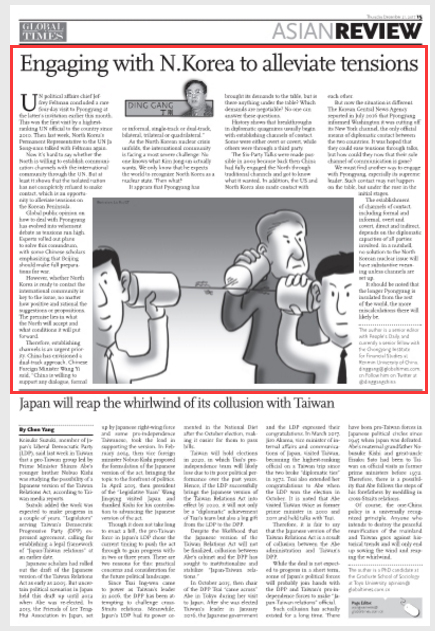Major Power Relations
Your Present Location: PROGRAMS> Major Power RelationsDing Gang: Engaging with North Korea to alleviate tensions
By Ding Gang Source: Global Times Published: 2017-12-20
UN political affairs chief Jeffrey Feltman concluded a rare four-day visit to Pyongyang at the latter`s invitation earlier this month. This was the first visit by a highest-ranking UN official to the country since 2010. Then last week, North Korea`s Permanent Representative to the UN Ja Song-nam talked with Feltman again.

Now it`s hard to say whether the North is willing to establish communication channels with the international community through the UN. But at least it shows that the isolated nation has not completely refused to make contact, which is an opportunity to alleviate tensions on the Korean Peninsula.
Global public opinion on how to deal with Pyongyang has evolved into vehement debate as tensions run high. Experts rolled out plans to solve this conundrum, with some Chinese scholars emphasizing that Beijing should make full preparations for war.
However, whether North Korea is ready to contact the international community is key to the issue, no matter how positive and rational the suggestions or propositions. The premise lies in what the North will accept and what conditions it will put forward.
Therefore, establishing channels is an urgent priority. China has envisioned a dual-track approach. Chinese Foreign Minister Wang Yi said, "China is willing to support any dialogue, formal or informal, single-track or dual-track, bilateral, trilateral or quadrilateral."
As the North Korean nuclear crisis unfolds, the international community is facing a most severe challenge: No one knows what Kim Jong-un actually wants. We only know that he expects the world to recognize North Korea as a nuclear state. Then what?
It appears that Pyongyang has brought its demands to the table, but is there anything under the table? Which demands are negotiable? No one can answer these questions.
History shows that breakthroughs in diplomatic quagmires usually begin with establishing channels of contact. Some were either overt or covert, while others were through a third party.
The Six-Party Talks were made possible in 2003 because back then China had fully engaged the North through traditional channels and got to know what it wanted. In addition, the US and North Korea also made contact with each other.
But now the situation is different. The Korean Central News Agency reported in July 2016 that Pyongyang informed Washington it was cutting off its New York channel, the only official means of diplomatic contact between the two countries. It was hoped that they could ease tensions through talks, but how could they now that their sole channel of communication is gone?
We must find another way to engage with Pyongyang, especially its supreme leader. Such contact may not happen on the table, but under the rose in the initial stages.
The establishment of channels of contact, including formal and informal, overt and covert, direct and indirect, depends on the diplomatic capacities of all parties involved. In a nutshell, no solution to the North Korean nuclear issue will have substantive meaning unless channels are set up.
It should be noted that the longer Pyongyang is insulated from the rest of the world, the more miscalculations there will likely be.
The author is a senior fellow with the Chongyang Institute for Financial Studies at Renmin University of China.
Key Words: North Korea; UN; RDCY; Ding Gang























































































 京公网安备 11010802037854号
京公网安备 11010802037854号





